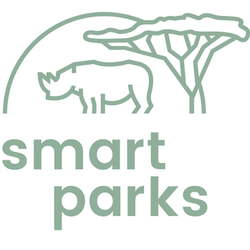Smart Parks
Smart Parks is an organisation which focuses on supporting conservation and anti-poaching using modern technology.
 | |
| Founded | 2017 |
|---|---|
| Founder | Laurens de Groot, Jeroen de Looze, Stephen Roest, Tim van Dam |
| Type | Stichting Foundation (Netherlands) Registered Charity (UK) |
| Focus | Conservation |
| Location | |
| Method | Advanced Technology |
Key people | Laurens de Groot, Jeroen de Looze, Tim van Dam, Steve Roest |
| Website | www.smartparks.org |
History
Smart Parks was formed by the merger of two charities ShadowView and Internet of Life in 2017. The organisation operates as a registered charity in the UK and a Stichting with a Social Enterprise model limited company in the Netherlands. The mission of Smart Parks is to utilise technology to assist in anti-poaching and park management across the world. The primary operational focus is to create a network of sensors and technologies that allows permanent live monitoring of assets in the park that is being protected. In 2017 Rwanda’s Akagera National Park launched the Smart Parks technology which allows park rangers to monitor animals, visitors, and equipment in real-time. The Smart Parks system is based on the LoRa technology a Long Range Wide-Area Network (LoRaWAN) with low-bandwidth, low-power networking technology that can blanket large areas at relatively low costs.[1]
Operations
In January 2017 The Internet of Life and the ShadowView Foundation organisations co-developed a LoRa-equipped sensor that is implanted directly into a rhinoceros horn for protection against poaching in Akagera National Park. The sensor has given park rangers the ability to accurately monitor the whereabouts and activities of the critically endangered black rhinos and keep them safe from wildlife criminals and poachers. The LoRa-equipped tracking sensor is part of a comprehensive LoRaWAN™-based IoT security solution utilised by Smart Parks[2] that is now being deployed throughout Mkomazi National Park and many other locations. [3]. [4].
Smart Parks has installed its fourth and largest African smart park to date in Malawi's Liwonde National Park in October 2018. In just two weeks, the 548km2 national park was equipped with gateways and sensors that gather information to help improve park management and protection. The construction of the network in the Liwonde National Park was implemented alongside a team from African Parks, a conservation NGO that manages the park on behalf of the Malawian government. The group was trained by Smart Parks for the construction of the site [5].
Smart Parks announced in 2018 an operation in the Serengeti National Park a World Heritage site.[6] .
Partners
Smart Parks partners with African Parks, WWF, Save the Children, Semtech and many technology partners and have won the following awards: Human Wildlife Conflict Challenge through WWF and WildLabs [7] Tech for Global Good Laureate 2018 [8] [9]
References
- "High Tech plan to combat poachers". The Verge.com. 20 July 2017.
- "Park rangers use IoT in mission to save endangered black rhinos". Internet Of Business. 29 September 2017.
- "Semtech LoRa Technology Tracks Location of Endangered Black Rhinos in Africa". GlobeNewswire.com. 17 Jan 2017.
- "Black rhinos in Tanzania now monitored via sensors implanted directly in their horns". MongaBay. 24 Oct 2017.
- "See How This New Smart Park in Africa Could Help Rangers Curb Poaching". Forbes.com. 7 Nov 2018.
- "Serengeti National park". ensia. 6 June 2018.
- "Human Wildlife conflict Challenge". WWF. 1 November 2017.
- {{Cite news|title=Smart Parks receives honorary title Tech for Global Good 2018 in America|url=https://www.emerce.nl/wire/smart-parks-krijgt-eretitel-tech-for-global-good-2018-amerika%7Cpublisher=EMERCE |date=18 September 2018}
- "2018 Tech Laureate Winners". Tech Museum of innovation. 6 November 2018.